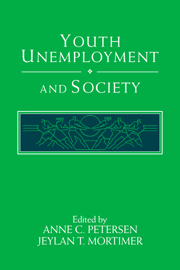Book contents
- Frontmatter
- Contents
- Contributors
- Foreword
- Introduction
- I INVESTMENT IN YOUTH
- II MACROSOCIAL PERSPECTIVES
- III INDIVIDUAL PERSPECTIVES
- 6 Concepts of causation, tests of causal mechanisms, and implications for intervention
- 7 Individual differences as precursors of youth unemployment
- 8 The psychosocial consequences of youth unemployment
- IV SOCIAL CONSEQUENCES AND INTERVENTIONS
- V IMPLICATIONS FOR RESEARCH
- Index
8 - The psychosocial consequences of youth unemployment
Published online by Cambridge University Press: 05 May 2010
- Frontmatter
- Contents
- Contributors
- Foreword
- Introduction
- I INVESTMENT IN YOUTH
- II MACROSOCIAL PERSPECTIVES
- III INDIVIDUAL PERSPECTIVES
- 6 Concepts of causation, tests of causal mechanisms, and implications for intervention
- 7 Individual differences as precursors of youth unemployment
- 8 The psychosocial consequences of youth unemployment
- IV SOCIAL CONSEQUENCES AND INTERVENTIONS
- V IMPLICATIONS FOR RESEARCH
- Index
Summary
Introduction
During the past 20 years, since the problem first became acute in the Western world, there have been a number of important studies of youth unemployment in various countries: Australia (Gurney, 1981), Britain (Warr, Banks, & Ullah, 1985), Sweden (Hammarstrom, Janlert, & Theorell, 1988), and the United States (Raelin, 1981). Furthermore, there is a burgeoning literature on the psychological experience and consequence of being unemployed (Fryer & Payne, 1986; Warr, 1987).
The title of this chapter raises three issues. The first is the direction of causality with respect to the causes and consequences of unemployment. The second is whether there are unique and/or special effects of unemployment on the young as distinguished from other groups. The third issue concerns the consequences of employment, as opposed to unemployment, for young people. A central theme of this chapter is that the meaning and significance of employment status for youth vary in different social contexts; the consequences of employment are probably not the same for all young people.
Cause, Correlate, and Consequence
Historically there have been three major periods of research on unemployment in the twentieth century: the late Victorian/early Edwardian period, the depression years of the 1930s, and the decade of the 1980s. Whereas some of the earlier studies focused on the indolence and work-shy nature of the unemployed—suggesting that in many instances the unemployed are architects of their own misfortune—most recent studies have focused on the serious negative psychosocial consequences of unemployment.
- Type
- Chapter
- Information
- Youth Unemployment and Society , pp. 199 - 224Publisher: Cambridge University PressPrint publication year: 1994
- 5
- Cited by



